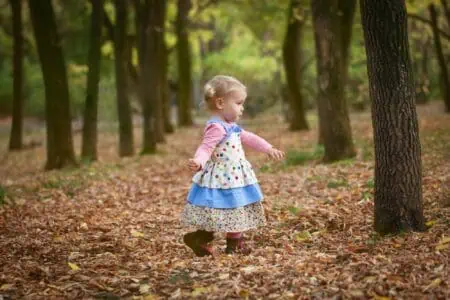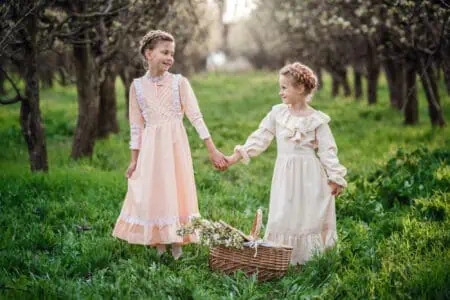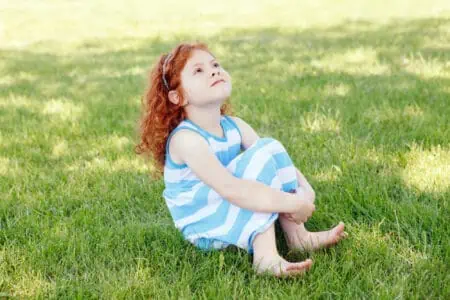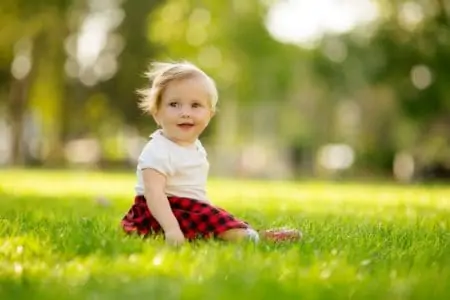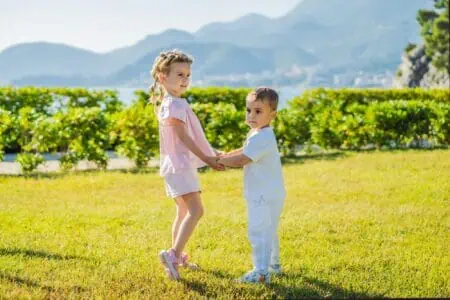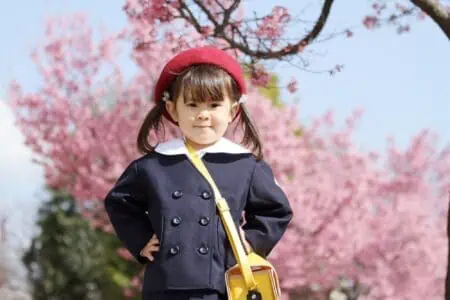Russian girl names carry with them a special place in ancient history across the world- making it no surprise to see many of them making a great comeback today!
Russian parents always take great pride in choosing a name for their beloved daughter. Names will often carry three naming elements: the first name, the patronymic name (or middle name), and the surname.
So whether you’re looking for a very traditional or unique Russian female name, or perhaps something a little more cute and popular, we’ve got you covered from every angle.
https://honeyname.com/british-girl-names/
100 Beautiful Russian Names for Girls
You may get wrapped up in all the beauty and elegance from these Russian girl names.
Agafiya
Agafiya is a traditional Christian name among Russian girls. It originates from the Greek word “agathē,” meaning “kind or good,” and is a variant of the old Russian names Agafya and Ogafya.
- Origin: Russian
- Meaning: Good, kind, noble
- Pronunciation: ah-gah-fee-ya
- Variations: Agafa,
- Namesakes: Agafya Grushetskaya, was a Tsaritsa of Russia in the 1600s, remembered in history as “an angel of heaven.”
- Popularity: Agafiya is pretty rare among Russian girl names.
Aleksandra
Aleksandra is the Russian variation of the Greek name Alexander. This strong name consists of two Greek verbs: “alexein” meaning “to defend,” and “andros” meaning “man.” In Greek mythology, Alexandra was one of the bynames for the goddess Hera, which roughly means “one who comes to save warriors.” Russian parents will often use the short form, Sasha, and the diminutive form Sashenka which means “little Sasha.”
- Origin: Russian, Greek
- Meaning: Helper, defender, protector of mankind
- Pronunciation: ah-lek-san-dra
- Variations: Aleandra, Alecsandra, Alejandra, Alessandra, Alexandria
- Namesakes: Aleksandra Goryachkina, a professional Russian chess player and Grandmaster ranked the second-best female chess player in the world.
- Popularity: Aleksandra remains among the top 20 Russian girl names but is rare in other parts of the world.
Alina
Alina is popular among parents from central and eastern Europe. A special name to depict the beautiful new life about to enter your world.
- Origin: Russian, Slavic
- Meaning: Bright and beautiful
- Pronunciation: UH-lee-nuh
- Variations: Alaina, Alana, Alianna, Aliya
- Namesakes: Alina Maksymenko, a Russian rhythmic gymnast and multiple world champion medalist. Alina Pogostkina, a Russian-German professional violinist and a member of the world’s most famous orchestras.
- Popularity: Alina has sprung into the top 200 girl names, reaching #170 in 2020.
Alisa
Alisa offers an inspiring meaning and appealing sound. This delightful and joyful name also has its roots in Ukrainian, Siberian and Finnish.
- Origin: Russian, Hebrew
- Meaning: Great happiness
- Pronunciation: ah-LEE-sah
- Variations: Alicia
- Namesakes: Alisa Childers, an American singer and songwriter known for her role in the Christian music group ZOEgirl.
- Popularity: Alisa was most popular in the 1960s and 1970s and has since slipped off the top 1000 in 2017.
Alyona
Alyona is the delightful short form of Yelena, which is the Russian version of the name Helen or Helena. A stunning meaning to portray the ray of light and happiness about to enter your life.
- Origin: Russian, Greek
- Meaning: Torch of light, bright
- Style: Modern, Free-spirited
- Pronunciation: ahl-YO-nah
- Variations: Aliona, Aliyona, Aliena, Alyena, Aliona
- Namesakes: Alyona Alekhina, a Russian-American professional snowboarder and multiple championship winner. Alyona Lanskay, a Belarusian pop singer, who reached the semi-final in the Eurovision Song Contest.
- Popularity: Alyona is pretty popular among Russian names for girls.
Anastasia
Anastasia is the feminine version of the Greek name Anastasius. It has its roots in a range of languages, including Greek, Russian, Ukrainian, and Siberian. Anastasia remains one of the top 10 girl names in Eastern Europe today. Traditionally, Russian parents will use Nastya as the short name, while the diminutive form or pet name is Nastyenka or Nastyona.
- Origin: Russian, Greek
- Meaning: Resurrection
- Pronunciation: ah-nas-tah-see-ah
- Variations: Anastacia, Anastasie, Anastasiya, Anastassia, Stasya, Tasia
- Namesakes: Anastasia Markovych, the First Lady of Ukraine in the early 1700s, and a trusted political advisor to her husband, Ivan Skoropadsky.
- Popularity: Anastasia has remained a popular favorite among Russian girl names for centuries.
Angelika
Angelika is derived from the Latin word angelicus, meaning “angelic,” which is ultimately taken from the Greek word “angelos.” This touching name has been in use throughout Poland, Germany, Slovakia, Czechoslovakia, and Russia since the 18th century.
- Origin: Latin
- Meaning: Messenger of God
- Pronunciation: ahn-zhell-ee-kuh
- Variations: Angelia, Angelica
- Namesakes: Angelika Machinek, a German glider pilot and champion who broke nine FIA gliding world records. Angelika Hurwicz, a German actress and theatre director.
- Popularity: Angelika is considered less common among Russian female names. Its modern counterpart Angelica is way more popular.
Anoushka
Anoushka is derived from the beautiful and popular name Anna, which is a variant of the Hebrew female name Hannah. So if you’re looking for something unique and not as common as Anna, then Anoushka could make a stunning choice. A wide range of countries is also known for taking a liking to this sweet gem.
- Origin: Russian
- Meaning: Favor, gracious, merciful
- Pronunciation: ah-NOOSH-kah
- Variations: Anouska, Anuschka, Annushka, Anushka
- Namesakes: Anoushka, otherwise known as Vartanoush Garbis Selim, is an Egyptian singer and actress. Anoushka Nara Giltsoff, a British entrepreneur and media personality, who married the comedian and actor, Sean Lock.
Antonina
Antonina is the feminine form of the Greek boy name Antonius. This stylish name has its roots in a wide range of origins, including Bulgarian, Polish, Ukrainian, Slovakian, Georgian, and Russian.
- Origin: Russian, Latin
- Meaning: Invaluable
- Pronunciation: an-TON-ee-nah
- Variations: Antona, Antonie, Antonina, Antonnea, Antonya
- Namesakes: Antonina Kymytval, a Chukchi poet and children’s writer, who received the Badge of Honor for her contribution to literature. Antonina Shuranova, a Russian actress who starred in many Russian films.
- Popularity: Antonina was fairly popular in the early 1900s and has since slipped off the popularity charts.
Bronya
If you’re looking for a name that stands out, Bronya could be quite a keeper. This inspiring name offers a sense of courage, honor, and commitment.
- Origin: Russian, Polish
- Meaning: Armor, strength, protection
- Pronunciation: bron-ya
- Variations: Broonya, Bronja, Brunya
- Popularity: Bronya is pretty rare among Russian female names.
Bogdana
Bogdana is the feminine form of Bogdan, which is a Slavic masculine name commonly used in Romania, Moldova, and Russia. If broken up, “bog or boh” means “god,” while “dan” means “given.” Bogdana is also the name of a monastery in Romania.
- Origin: Slavic, Russian, Polish
- Meaning: The Lord has rendered, given from God
- Pronunciation: bawg-DAH-nah
- Variations: Bagdana, Bogdanna, Bohdana
- Namesakes: Bogdana Lukashevich, a Russian professional pair skater and champion.
- Popularity: Bogdana is considered rare among Russian names for girls.
Boleslava
Boleslava is the Russian and Czech version of the Polish girl’s name Boleslaw. A very old, unique name derived from Slavic elements – with “bolye” meaning “more or greater,” and “slava” meaning “glory.”
- Origin: Russian, Polish
- Meaning: Greater, glory
- Pronunciation: BO-leh-sla-vah
Czarenah
Czarenah was the common title given to a female monarch in Bulgaria, Serbia, and Russia. Other similar titles, depending on the origin, included Tzarina, Tsarina, or Tsaritsa. From 1721, Russian monarchs were commonly called Empress, and titles such as Czarenah became pet names. Alexandra Feodorovna was the last female monarch of Russia, through her marriage to Emperor Nicholas II. She and her family were killed in captivity by Bolshevik revolutionaries in 1918.
- Origin: Russian
- Meaning: Female supreme ruler, empress
- Pronunciation: zaa-REE-nuh
- Variations: Czarinah
- Popularity: Czarenah is a pretty uncommon name among Russian girls.
Diana
Diana makes a gorgeous, versatile name and is commonly used across a wide range of languages in Central and Eastern Europe. The ancient Greek version of the name, Diviana, comes from the Indo-European root word “dyeu or dyeus,” which means “to shine” or “sky.” In the classical tradition, Diana is a Roman goddess of the hunt, wild animals, fertility, and the Moon. In Russian households, Dianochka is the pet name typically used, while Dianka is the diminutive form.
- Origin: Latin
- Meaning: Divine woman
- Pronunciation: dee-anna
- Variations: Deana, Diane, Dianna, Dyana
- Namesakes: Diana Vishneva, a Russian professional ballerina who performs as the principal dancer with the Mariinsky Ballet company.
- Popularity: Diana has remained pretty popular among Russian girl names, rated #244 in 2020.
Daria
Daria is the Russian female version of the name Darius, which in Old Persian means “he who holds firm the good.” In the late 19th century, Daria was considered a rustic name, typically associated with peasant women. However, its popularity increased considerably in the late 20th century, becoming the 3rd most popular girl’s name in Moscow and Saint Petersburg. Russian parents love to use Dasha as the diminutive for this sweet name.
- Origin: Russian
- Meaning: Wealthy
- Pronunciation: dah-ree-ah
- Variations: Darya, Dariya, Dasha
- Namesakes: Daria Klimentová, a Czech ballet dancer, teacher, and photographer, known for starring in several ballet companies across the world. Daria Kondakova, a Russian rhythmic gymnast and multiple world champion.
- Popularity: Daria was popular in the USA between 1947 and 1999 and has since slipped off the popularity charts.
Dominika
Here’s a darling Russian name that is easy to use across a range of languages. Dominika is the Russian and Czech version of Dominic or Dominique. This strong name originally comes from the Roman-Italian name Dominicus, which means “lordly” or “belonging to God.” This could even make a special choice for parents who value religion and remaining true to their Russian heritage.
- Origin: Russian, Czech
- Meaning: From the Lord, Lord’s child
- Pronunciation: DAW-mi-ni-kah
- Variations: Domenica, Dominica, Dominique
- Namesakes: Dominika Mirgová, a Polish singer and actress, who has released several albums following her performances in the SuperStar Search Slovakia.
Dushenka
Dushenka is a variation of the Russian name Duscha. A Russian poet, Ippolit Bogdanovich, wrote a poem called Dushenka in 1778. His long satirical poem on a heroine brought him great fame throughout Russia, leading him to write poetry and theatre performances for Russian royalty.
- Origin: Russian
- Meaning: Happy
- Pronunciation: duh-shen-kah
- Variations: Duschenka, Duschinka
Ekaterina
Ekaterina is the Russian and Bulgarian version of the name Katherine. Some sources say it is an alternative transliteration of the Russian name Yekaterina. This charming name is commonly shortened to Katya and Katyusha. A stunning meaning to capture the perfect treasure entering the world. In Russian, the traditional name day for Ekaterina is the 7th of December.
- Origin: Russian
- Meaning: Pristine, perfect
- Pronunciation: yi-ki-tah-ree-nah
- Variations: Yekaterina
- Namesakes: Ekaterina Gordeeva, a Russian figure skater, with her husband, the late Sergei Grinkov, was a two-time Olympic champion and a four-time World Champion.
Eleonora
Eleonora is the gorgeous Russian version of the Greek name Eleanor. Likely inspired by Eleanor of Aquitaine, the queen consort of France and England from the 12th century. Some sources suggest the Latin version of the name also means “one who heals.” The beautiful Russian short form is Elya or Nora, while the pet version is Elyechka or Norushka.
- Origin: Russian, Greek
- Meaning: Sun ray, sympathy, compassion
- Pronunciation: E-lee-oh-no-rah
- Variations: Eleanora, Eleanor, Elnora, Ella, Ellie, Ellinor
- Namesakes: Eleonora Duse, an Italian actress, regarded by many as the greatest of her time. Eleonora Gabrielian, a Soviet, Armenian botanist and professor.
- Popularity: Eleonora has fluctuated in popularity over the years and is starting to increase in popularity again.
Elvira
The exact origin of this beautiful name is unknown. However, some sources suggest it comes from the German words “ala” meaning “all” and “wer” meaning “true.” While other sources say it means “white or fair.” You will come across different versions of this name in Spanish, Italian, Dutch, and Hungarian. The stunning pet name is Elvirochka, while the diminutive form is Elvirka.
- Origin: Russian
- Meaning: All true, white, fair
- Pronunciation: ehl-VEE-rah
- Variations: Elviira, Elvire, Elwira, Elvīra
- Namesakes: Elvira Amazar, a Siberian-born, Russian-American soprano singer and actress popularly known for inspiring the term “better than cheesecake.”
- Popularity: Elvira was popular between 1900 and 1981 and has since become a rare girl’s name.
Evva
Here’s a sweet name for parents who wish to find a versatile Russian name. Evva is the Russian variation of the popular Hebrew name Eve, which means “living and breathing.” Notably, Evva is inspired by one of the most popular girl names in Christianity and Judaism, recorded as the first woman created by God in the Biblical book of Genesis.
- Origin: Russian
- Meaning: Life
- Pronunciation: yeh-vah
- Variations: Eve, Eva
- Popularity: Evva is fairly uncommon among Russian names for girls.
Evelina
Evelina is a delightful Russian girl’s name derived from the Latin name Aveline. Russians will generally use Evelinochka as the pet version of the name, while Evelinka is the common diminutive. A wonderful name choice that has been adapted across a range of different languages.
- Origin: Russian, Germanic
- Meaning: Longed for
- Pronunciation: eh-veh-LEEN-ah
- Variations: Eveleena, Evalina, Evelyna, Avaline, Aveline
- Namesakes: Eveliina Tammenlaakso, better known by her stage name Evelina, is a Finnish singer and songwriter.
- Popularity: Evelina was popular in the early 1900s and then slipped off the popularity charts.
Faina
The precise origin of this sweet-sounding name is unknown. However, some sources say Faina is derived from the Greek name Phaenna, taken from the word phaeinos, meaning “shining.” In Greek mythology, Phaenna was one of the members of the Charites or goddesses of charm, beauty, nature, and creativity. Faina also offers some gorgeous short versions and pet names, such as Fayusha and Fainka.
- Origin: Russian, Greek
- Meaning: The shining
- Pronunciation: fu-EE-nah
- Namesakes: Faina Melnik, a Soviet discus thrower and Olympic champion, known for setting 11 world records.
- Popularity: Faina is pretty rare among Russian girl names.
Feodora
Feodora is the beautiful Russian version of the ancient Greek name Theodora. A delightful name to capture the beautiful gift of life and hope about to come your way.
- Origin: Russian, Greek
- Meaning: Gift of God
- Pronunciation: fe-ah-DO-rah
- Namesakes: Lady Feodora Gleichen, was a British sculptor and designer, whose father was the nephew of Queen Victoria.
- Popularity: Feodora is considered a rare girl’s name, not listed on any popularity charts.
Galina
Galina offers an inspiring meaning for parents who value peace and harmony in their life. It originates from the Slavic name Galen, which also means “calm healer.” In Russian, the pet form commonly used is Galyusha, while the diminutive is Galka.
- Origin: Greek, Russian
- Meaning: Woman of serenity
- Pronunciation: gah-LEE-nah
- Variations: Gallina
- Namesakes: Galina Ulanova, a Russian ballet dancer, recognized as one of the greatest ballerinas of the 20th century. Galina Timchenko, a Russian journalist and executive producer of Meduza.
- Popularity: Galina is pretty rare among Russian female names.
Gennadiya
Gennadiya is a gorgeous girl name, strongly rooted in Russian culture. Gennadi and Gennadiy is the male version of the name, ultimately taken from the Greek name Gennadius. This honorable name originates from the Byzantine Empire or the Eastern Roman Empire.
- Origin: Russian
- Meaning: Noble
- Pronunciation: yeh-nah-dee-ah
- Variations: Gennadius, Gennady
- Popularity: Gennadiya is pretty rare among Russian girl names.
Glafira
Glafira is a variant of the ancient Greek name glaphyros. Russians will often use the pet name Galyusha, while the common pet name is Glashka.
- Origin: Russian, Greek
- Meaning: Polished, subtle
- Pronunciation: glah-fee-rah
- Namesakes: Glafira Alymova, a Russian lady in waiting for Catherine the Great and the best harpist of her time from 1758 to 1826.
- Popularity: Glafira is a rare girl’s name, not listed on any popularity charts.
Inna
Little is known about this name’s exact origin or meaning, so if you’re one for an element of mystery, Inna could be a keeper! Inna has become quite popular among Russian and Ukrainian parents. This name is said to be inspired by an East Orthodox male martyr.
- Origin: Russian
- Meaning: Fast river, sparkling water, innocent
- Pronunciation: EE-nah
- Namesakes: Elena Alexandra Apostoleanu, professionally known as Inna, a famous Romanian singer and songwriter. Inna Churikova, a Soviet Russian actress, who starred in No Path Through Fire and Nachalo (The Debut).
- Popularity: Inna is pretty popular among Russian girl names, while rare throughout the rest of the world.
Innessa
Little is known about this beautiful and rare Russian name. However, some sources say it is a unique variation of the Greek word “hagnos” which means “sacred or pure.” It may be related to the names Agnes and Ines. Innessa is also heard in Spanish and German families.
- Origin: Russian, Greek, Spanish
- Meaning: Purity
- Pronunciation: eh-nyo-sah
- Variations: Inesa, Inessa, Ines, Inaas
- Popularity: Innessa is considered a very rare Russian female name, not listed on any popularity charts.
Irina
Irina is the feminine form of the ancient Greek name Eirene, the goddess of peace. This touching name is heard in several other languages, including Bulgarian, Serbian, Romania, Ukrainian and Armenian. So if you’re hoping to find a versatile name, also strong in Eastern Orthodox Church tradition, then Irina could make a stunning choice.
- Origin: Russian, Greek
- Meaning: Peace
- Pronunciation: eh-ree-nah
- Variations: Erina, Irene, Arina
- Namesakes: Irina Yusupova, a Russian Princess and only child of Prince Felix Yusupova in 1915. Irina Allegrova, a Russian singer known for winning a Russian Grammy for Best Pop Female Star for her Album Ugonschitsa in 1994 to 1995.
Izabella
Izabella is the Russian version of the more popular name Isabel, which is ultimately the Spanish or Italian version of the Hebrew name Elizabeth. This gorgeous name may inspire your daughter to accomplish great things within her life.
- Origin: Russian, Polish
- Meaning: Pledged to God
- Pronunciation: ee-zah-bel-lah
- Variations: Isabella, Isabel, Izabelle, Isabela
- Namesakes: Izabella St. James or Izabella Katarina, a Polish writer and actress and former girlfriend of Hugh M. Hefner. Izabella Poniatowska, a Polish Countess and noblewoman from the mid 1700s.
- Popularity: Izabella is pretty popular among Russian girl names, reaching #341 in 2020.
Jana
Jana originates from the Hebrew masculine name Yochanan, which means “God is merciful.” However, depending on the language, Jana can carry a range of different meanings. In Persian, Jana means “my dearest or my soul,” while in Arabic, it means “to earn or reap.” In Albanian, it is short for Jehona, which means “echo.” It also offers a delightful pet name such as Janochka, while Janka is the common term of endearment.
- Origin: Russian, Czech
- Meaning: God is merciful or gracious
- Pronunciation: yah-nah
- Variations: Janna, Janina, Jannina, Janeka
- Namesakes: Jana Khokhlova, a former Russian competitive ice dancer, who was the 2008 world bronze champion, and two-time Russian national champion in 2008 and 2009.
- Popularity: Jana was most popular in the late 1970s, and while remaining pretty popular, it slipped off the popularity charts in 2018.
Jelena
Jelena is a gorgeous name originating from both Russian and Slavic languages. It is derived from the Slavic girl’s name Yelena, which is a slavicized form of the Greek name Helen. This lovely name offers a range of beautiful pet names, such as Jelica, Jele, Lena, Lenotschka, and Lenka. Some sources say it also means “deer or stag” in Russian.
- Origin: Slavic, Russian
- Meaning: Light
- Pronunciation: yeh-lee-nah
- Variations: Yelena , Elena
- Namesakes: Jelena Karleuša, a Serbian singer and media personality, known as the “Madonna of the Balkans” and “Lady Gaga of Serbia.” Jelena Mrdjenovich, a Serbian-Canadian boxer, ranked as the world’s second-best active female by The Ring in 2020.
- Popularity: Jelena is pretty common among Russian and other East European countries.
Karolina
Karolina is the exquisite Russian and Czech version of the German girl’s name Caroline. This charming name has been one of the most popular girl names across Europe over the centuries and carries a wide range of origins. Karolina can also be easily shortened into some stunning nicknames, such as Karo, Karol, or Lina.
- Origin: Russian, Czech, German, Polish
- Meaning: Freewoman
- Pronunciation: KAH-raw-lee-nah
- Variations: Karlina, Karolin, Carolina, Caroline, Karolyn
- Namesakes: Karolína Plíšková, a Czech professional tennis player, and former world no.1 in women’s singles. Karolina Kowalkiewicz, a Polish mixed martial artist.
- Popularity: Karolina is considered a pretty popular Russian girl’s name.
Katerina
Katerina offers a gorgeous meaning for parents who value purity and wholeness. It is a Greek variation of the name Ekaterini and a shortened form of the Russian and Bulgarian names Ekaterina and Yekaterina. The name is also associated with the Greek word Katharos, which means “pure.” Katerina could make a stunning choice for parents who are looking for a more versatile name, adaptable across many languages or cultures.
- Origin: Russian, Ukrainian, Greek
- Meaning: Pure
- Pronunciation: kah-tah-ree-nah
- Variations: Katherina, Ekaterina, Yekaterina, Katherine
- Namesakes: Katerina Maleeva, a Bulgarian tennis player, ranking no.6 in WTA rankings in 1990. Katerina Stikoudi, a Greek singer, model, actress, and ex-swimming athlete, who won the title of Miss Hellas.
- Popularity: Katerina is pretty popular among Russian girl names.
Khristina
Khristina is the delightful Russian version of the Latin girl’s name Christina, meaning “Christian women.” This beautiful name has been adapted into a wide range of languages across the centuries. Many famous saints have carried this name, including royalty, politicians, entertainers, and sportswomen. Russian girls with this name will also use Kristinochka as the pet name and Kristinka as a term of endearment.
- Origin: Russian, Latin
- Meaning: Follower of Christ
- Pronunciation: kris-TEE-nah
- Variations: Kristina, Kristeena, Krisztina, Kia
- Namesakes: Khristina Kalcheva, a Russian-Bulgarian professional high jumper who was the World Indoor Champion in 1999.
- Popularity: Khristina is a common favorite among Russians and other East European families.
Klavdiya
Klavdiya is considered a pretty old-school Russian girl name. You may also be inspired by the strong and courageous Russian ladies who have carried this unique name. Russian families will use Klashen’ka as the pet name, while Klavka or Klashka is commonly used by closer friends or family.
- Origin: Russian, Serbian, Ukrainian
- Meaning: Pure, chaste
- Pronunciation: kat-yah
- Variations: Klava, Klasha, Klavdia
- Namesakes: Klavdiya Shulzhenko, a Soviet Russian singer and actress known for performing thousands of concerts for Soviet soldiers, was awarded the Order of the Red Star in 1945. Klavdiya Blinova, a heroic Soviet fighter pilot and lieutenant.
Kira
Kira comes with multiple origins, so this could make a trendy, more versatile name for your precious girl. In ancient Hebrew, it comes from the name “Keren,” which means “horn” or “beam of light.” It also means “strong woman” in Slavic, “dark haired” in Irish, and “glittery or shiny” in Japanese. In Russian, Kira is the feminine version of Kir, which means “mistress or ruler.”
- Origin: Russian
- Meaning: Throne, shine, light, ruler of the people
- Pronunciation: kee-rah
- Variations: Keera, Kiera, Kirah, Kiria, Kiriah
- Namesakes: Kira Kazantsev, a Russian-American beauty pageant titleholder, best known for winning Miss America 2015.
- Popularity: Kira has remained a pretty popular name from the 1970s, last rated at #384 in 2020.
Larissa
Larissa is commonly used throughout Eastern Europe, mostly popularized through the Orthodox church. In Greek mythology, Larissa was a nymph and daughter of Pelasgus and was also the name of an ancient city in Greece, which means “citadel.” A martyr, Saint Larissa, who inspired many Russian parents to adopt this beautiful name, was a part of the Gothic persecution of Christians during the 4th century. When shortening the name, Russians tend to use Lyalya as the pet version of the name.
- Origin: Russian, Latin
- Meaning: Cheerful, light-hearted
- Variations: Larisa, Larissa, Larryssa, Laryssa
- Namesakes: Larissa Tudor, wife of Frederick Morton Tudor, who was rumored to be the Grand Duchess Tatiana Nikolaevna of Russia, the second daughter of Tsar Nicholas II.
- Popularity: Larissa was most popular in 1994 and while considered pretty popular, it slipped off the popularity charts in 2012.
Lena
Lena carries a wide range of origins and is a shortened version of several names, such as Helena, Selena, and Alina. The great Lena River also carries this charming name- part of the three great Siberian rivers that flow into the Arctic River. It is recorded as the 11th longest river in the world and the longest river in Russia.
- Origin: British, German, Russian, Persian
- Meaning: The ray of light, the torch of light
- Pronunciation: lee-nuh
- Variations: Leena, Lenna, Leana, Lina, Lenka
- Namesakes: Lena Hades, a Russian painter, writer, and art theorist.
- Popularity: Lena was very popular in the early 1900s and remains a pretty popular name at #270 in 2020.
Lenushka
If you’re looking for an elegant classic girl name, then Lenushka is quite a keeper. An inspiring meaning for a darling daughter sure to bring a fresh ray of love and goodness into your life.
- Origin: Russian
- Meaning: Sunray, shining light
- Pronunciation: leh-nush-kah
- Variations: Lenuschka, Lenusya, Lenyushka, Lenya
- Popularity: Lenushka is less common among Russian girl names.
Lidiya
Lidiya is the beautiful Russian version of the Greek girl’s name Lydia. This beautiful name comes from the ancient Kingdom of Lydia and would refer to the people who lived in the city. Russians would typically use Lida as the pet name, while Lidochka is the diminutive form.
- Origin: Russian, Greek
- Meaning: Coming from Lydia
- Pronunciation: LID-ee-ah
- Variations: Lidia, Lidiy, Lyda, Lydie, Lida
- Namesakes: Lidiya Vertinskaya, a Soviet Russian actress and artist known for starring in fairy tale films, such as New Adventures of Puss-in-Boots in 1985.
Ludmila
Ludmila is of Slavic origin, and consists of two elements- namely “lud” meaning “people,” and “mila” meaning “dear love.” This name is frequently used throughout Eastern Europe and offers many beautiful variations. A famous saint, Ludmila of Bohemia, carried this name. She was married to the first Christian Duke of Bohemia in 873. Although her death is shrouded in mystery, Ludmila was the first Slavic saint and is remembered for her strong rulership and brave heart.
- Origin: Russian, Slavic
- Meaning: Graceful people
- Pronunciation: yud-mee-lah
- Variations: Ludomil, Ludmilla, Lyudmila, Ľudmila
- Namesakes: Ludmila Belousova, a Russian pair skater, and two-time Olympic Champion. Lyudmila Gurchenko, a Soviet, popular Russian actress and singer, known for her multifaceted career.
- Popularity: Ludmila is pretty popular among Russian female names.
Lunika
Lunika could be a delightful choice for parents looking for a unique Russian girl name. It certainly makes a stunning alternative to Luna while offering a similar air of mystery, elegance, and beauty.
- Origin: Russian
- Meaning: Little moon
- Pronunciation: luh-nee-kah
- Popularity: Lunika is considered a pretty rare name among Russian girls, while its more modern counterpart Luna is very popular, hitting #14 in 2020.
Lyubov
Lyubov originates from the Slavic word l’ub, which means “love.” It offers a range of alternative versions in Russian, Ukrainian, and Belarusian. The common Russian short form is Lyuba, while Lyubasha or Lyusenka is the common term of endearment. A stunning name capturing great elegance and beauty.
- Origin: Russian, Slavic
- Meaning: Loving woman
- Pronunciation: lyoo-BOF
- Variations: Lyubov, Lubov, Liubov, Lyubochka, Lyuba, Ljuba, Ljuboska
- Namesakes: Lyubov Dostoevskaya, a Russian writer, memoirist, and daughter of the famous writer Fyodor Dostoevsky.
- Popularity: Lyubov is very popular among Russian names for girls.
Marina
Marina is the female derivative of the Latin name Marinus, typically used across a range of European languages. Marisha is the most common diminutive form, while Marinka is usually used as a term of endearment.
- Origin: Russian, Latin
- Meaning: Of the sea
- Pronunciation: mah-REE-nah
- Variations: Mareena, Maren, Marine, Marinka, Marinna
- Namesakes: Marina Abramović, a Serbian artist, philanthropist, writer, and filmmaker. Marina Poplavskaya, a Russian opera singer, known for holding many leading roles.
- Popularity: Marina is considered pretty popular among Russian girl names, remaining in the top 20 over many years.
Mariya
Mariya is a variation of the name Maria, inspired by the popular Hebrew names Mary and Miryam. While the exact meaning of the name is uncertain, some sources say it also means “sea of bitterness” or “rebelliousness.” In Arabic, it means “one who is pure.” Masha is the trendy short version of the name, and Mashenka is the common diminutive form.
- Origin: Russian
- Meaning: Wished for child, one who is pure
- Pronunciation: mah-ree-yah
- Variations: Mariah, Marie, Marija, Mariyah, Marya
- Namesakes: Mariya Abakumova, a professional Russian Olympic javelin thrower. Mariya Kiselyova, a Russian synchronized swimmer, Olympic gold medalist, and television presenter.
- Popularity: Mariya is pretty popular among Russian girl names.
Matresha
Matresha comes from the Russian and Latin name Matriona. Notably, this refers to the senior or chief nurse of an establishment. The word matron is derived from the Latin word for “mother.” A touching name capturing the elegance and kindness of an honorable lady.
- Origin: Russian
- Meaning: Lady, matron
- Pronunciation: mah-tre-sha
- Variations: Matrena, Matrina, Matryna, Matriona
Melania
Melania is derived from the Greek word “melania,” which means “black or dark” and is the Russian version of the more popular name Melanie.
- Origin: Russian, Greek
- Meaning: Dark-skinned, a woman of gloom
- Pronunciation: MEH-la-nee-ah
- Variations: Malinda, Melina, Melinda, Malaney
- Popularity: Melania is uncommon among Russian female names.
Mila
Mila is often used as a nickname for names such as Milena, Ludmila, and Milica, but has proven to be a wonderful first name as well. While typically used in Eastern Europe, Mila is also known for having Spanish origin, where it means “miracles” or “favored” in Spanish.
- Origin: Russian, Slavic
- Meaning: Gracious, dear
- Variations: Mika, Milla
- Namesakes: Mila Kunis, an American actress and producer, best known for playing Jackie Burkhart on That 70’s Show television series.
- Popularity: Mila has sky-rocketed in popularity, moving from #745 in 2006 to #20 in 2020.
Milyena
Milyena is a variation of the beautiful Russian name Milena. In Slavic, “mil” means “gracious, pleasant or dear.” The masculine version of the name is Milan and Milen. This touching name also offers some pretty nicknames, such as Mila, Lena, or Millie.
- Origin: Russian, Slavic
- Meaning: Gracious, pleasant, dear
- Pronunciation: mil-yeh-nah
- Variations: Milena
- Popularity: Milyena is a popular name among Russian and Slavic families.
Miroslava
Miroslava is fairly rare among girl names and is the feminine form of the name Miroslav. It consists of two Slavic words, namely “miru,” meaning “peace or world,” and “slava,” meaning “glory.”
- Origin: Russian, Slavic
- Meaning: Peaceful glory
- Pronunciation: my-ru-SLAF
- Variations: Mirka, Myroslav
- Namesakes: Miroslava Federer, or Mirka Federer, is a Swiss former professional tennis player and wife of tennis legend Roger Federer.
Mischa
Mischa is a unique and charming variation of the Russian name Mikhail, which ultimately comes from the Hebrew name Michael. The more traditional form Mikha’el means “who is like God?” Some sources say Mischa also means “honey or bees.”
- Origin: Russian
- Meaning: Who is like God?
- Pronunciation: MEE-shah
- Variations: Misha, Mishka
- Namesakes: Mischa Bakaleinikoff, a Russian musical director, film composer, and conductor.
- Popularity: Mischa is rare among Russian names for girls.
Nadezhda
Nadezhda is more commonly known as Nadia or Nadya in English-speaking countries. This gorgeous, more traditional Russian name is popular throughout Slavic languages. The short form Nadia is also popularly used as a stand-alone name, while Nadyenka or Nadyusha is the diminutive form.
- Origin: Russian, Bulgarian, Polish
- Meaning: Hope, filled with hope
- Pronunciation: nah-DYEZH-dah
- Variations: Nadeshda, Nadia, Nadine, Nadejda
- Namesakes: Nadezhda Krupskaya, a Russian revolutionary and wife of Vladimir Lenin. Nadezhda Tolokonnikova, a Russian conceptual artist, political activist, and member of the feminist group Pussy Riot.
- Popularity: Nadezhda is fairly popular among Russian girl names.
Natasha
Natasha is a Russian and Slavic name derived from Natalia, which refers to “Christmas day” in Latin. Another gorgeous short version of the name is Natalya, while the common diminutive form used among Russians is Natashenka.
- Origin: Russian
- Meaning: Birthday of Christ, Christmas Day
- Pronunciation: nah-TASH-ah
- Variations: Natacha, Natasza, Natisha, Tasha
- Namesakes: Natasha Bedingfield, an award-winning British singer and songwriter. Natasha Poly, a Russian supermodel.
- Popularity: Natasha is very popular among girls’ names in Russia, rated in the top 20 names, while in the USA it is slightly less popular, rated #950 in 2020.
Nevena
Nevena is pretty rare among Russian girl names. It is derived from the South Slavic word “neven” which means “marigold.” A stunning way to capture the rare beauty of your beautiful daughter.
- Origin: Russian
- Meaning: Marigold
- Pronunciation: ne-vee-nah
- Namesakes: Nevena Božović, a Serbian singer-songwriter. Nevena Kokanova, a Bulgarian actress known as the “first lady of Bulgarian cinema.”
Nikita
Nikita is a common name among girls from Eastern Europe and Greece. It is derived from the Greek word “nicetas,” which means “victor or winner.” Nicetas was popularized through a famous Christian martyr, Nicetas the Goth, from the 4th century. The beautiful Ukrainian and Belarusian version of the name is Mykyta, while the Romanian version is Nichita.
- Origin: Russian
- Meaning: Unconquered, winner, triumphant
- Pronunciation: ni-kee-tah
- Variations: Mikita, Mykyta, Nika, Nikkíta, Nikola
- Namesakes: Nikita Parris, an English professional footballer. Nikita Filatov, a Russian professional ice hockey player.
- Popularity: Nikita was most popular in the USA in 1986 and then slipped off the popularity charts in 2000.
Oksana
Oksana is a variation of the Russian name Kseniya, which originates from the Greek word Xenia or Xenos, meaning “stranger.” Xenya is the short form of the name, while Xenyechka is the common diminutive form.
- Origin: Russian, Greek, Ukrainian
- Meaning: Women of hospitality, Praise God
- Pronunciation: ahk-SAH-nah
- Variations: Oxana, Axana
- Namesakes: Oksana Akinshina, a Russian film actress best known for her roles in Sisters, Lilya 4-ever, and The Bourne Supremacy.
- Popularity: Oksana is pretty popular among Russian and Ukrainian girl names.
Olesya
Olesya is a Russian and Ukrainian name derived from the word “lyess” which is Russian for “forest.” Other sources suggest it is a variant for Alexandra, which means “protector.” Leysa is the typical short-form in Russian, while Lesyenka is the common diminutive.
- Origin: Russian
- Meaning: A girl from the forest
- Pronunciation: ah-lees-ah
- Variations: Olessia, Olesia
- Namesakes: Olesya Nurgalieva, a Russian professional ultramarathon runner, who dominated South Africa’s Comrades and Two Oceans Marathons from 2003 to 2014. Olesya Rulin, a Russian-American actress best known for co-starring in the High School Musical franchise as Kelsi Nielsen.
Ol’ga
Ol’ga or Olga is an East Slavic name derived from the Old Norse name Helga. Saint Ol’ga of Kieve popularized the name through the East Orthodox Church. She is also referred to as “Equal to the Apostles” and is known for encouraging the spread of Christianity. The Russian name day for Ol’ga is the 24th of July. Olya is the short form of the name, while Olyechka and Olyona are the traditional diminutives.
- Origin: Russian
- Meaning: Divine woman
- Pronunciation: AWL-gah
- Variations: Olina, Olunka, Olya, Olenka, Olga
- Namesakes: Princess Olga of Greece and Denmark, who was also the Princess and Regent of Yugoslavia. Olga Markova, a Russian long-distance runner who set the world’s best performance in 1992 when she won the Boston Marathon.
- Popularity: Ol’ga features in the top 20 Russian names for girls.
Olinia
Olinia is an alternative version of the Russian name Olena. This delightful name offers a range of beautiful versions. Perhaps the perfect name to capture the warm embrace of your gorgeous new girl.
- Origin: Russian, Greek
- Meaning: Sunray
- Style: Nature-loving, Free-spirited
- Pronunciation: oh-li-nee-ah
- Variations: Olenya, Olina, Olinija, Elena, Alena
Olympiada
Olympiada is a very old, traditional Russian feminine name, derived from the Ancient Greek male name Olympos or Olympus. Mount Olympus is the highest mountain in Greece and is believed to be the home of the Greek gods. In Ancient history, Olympias was the strong and daring mother of Alexander the Great, known for her strength and great influence upon her son.
- Origin: Russian
- Meaning: From Mount Olympus
- Pronunciation: oh-lim-pee-ah-da
- Variations: Olympus, Olympias, Olympus
- Namesakes: Olympias, the mother of Alexander the Great.
Polina
Polina is the French and Russian shortened version of the name Apollinaria. This intriguing name comes from the Greek god Apollo- the son of Zeus and Leto and the god of prophecy, medicine, music, art, wisdom, and beauty.
- Origin: Russian, Greek
- Meaning: Little
- Pronunciation: pah-lee-nah
- Variations: Paulina, Polly, Paula
- Namesakes: Polina Kostiukovich, a Russian pair skater and Junior World Champion. Polina Kuklina, a famous Russian fashion model.
Praskovya
Praskovya is a version of the Old Greek name Paraskeve, which means “preparation” or “Friday”- being the day of preparation. This name belonged to a 2nd-century saint who was martyred in Rome. The short form is Pasha, while the diminutive is Pashenka or Parasha.
- Origin: Russian
- Meaning: Friday
- Pronunciation: pras-kov-ya
- Variations: Paraskeva, Paraskevi
- Namesakes: Praskovya Ivanovna was a Russian tsarevna, daughter of Tsar Ivan V, and niece of Tsar Peter the Great. Praskovya Uvarova, née Princess Scherbatova, was a Russian archaeologist.
- Popularity: Praskovya is considered a rare name, not listed on any popularity charts.
Raisa
Raisa has become quite the old-time favorite in Russia, as a feminine variation of the name Rais. In some sources, this charming name is also considered of Hebrew and Yiddish origin.
- Origin: Russian, Greek
- Meaning: Easy-going
- Pronunciation: RIE-sah
- Variations: Raissa, Rayisa
- Namesakes: Raisa Blokh, a Russian poet and active member of the Berlin Poet’s Club in World War II. Raisa Orlova, a Soviet Russian writer and Americanist.
- Popularity: Raisa is popular among Russian girl names.
Rimma
Rimma is derived from the Russian word “rim,” which refers to the Italian city of Rome. A Slav martyr, Saint Rimmas, who lived in modern-day Bulgaria, likely popularized this name from the 1st century. Along with St. Inna and St. Pinna, St Rimma were disciples of the Apostle Andrew. Rimochka is the diminutive form of the name, while Rimka is the common term of endearment.
- Origin: Russian
- Meaning: From Rome
- Pronunciation: rim-mah
- Namesakes: Rimma Aldonina, a Russian architect and children’s poet. Rimma Bilunova, an award-winning Russian professional chess player
Roksana
Roksana is the beautiful Russian and Polish version of the name Roxanne. A name that ultimately comes from Persia and belonged to the wife of Alexander the Great. It carries a stunning meaning to convey the unmatched little beauty about to enter this world.
- Origin: Russian, Polish
- Meaning: Dawn, star of magnificence
- Pronunciation: rahk-SAN-ah
- Variations: Roksanne, Roxana, Roxane, Roxie
- Namesakes: Roksana Węgiel, a Polish singer who won the first season of the junior Polish show The Voice in 2018.
- Popularity: Roksana is a pretty rare name, while its English version Roxanne is way more popular.
Ruslana
Ruslana is the feminine variation of the old masculine name Yeruslan. This charming name comes from the Turkic word “arslan” which means “lion”- a word mainly used in Southeastern Europe and the Mediterranean, up to Siberia, Mongolia, Pakistan, and Western China.
- Origin: Russian
- Meaning: Lion, brave
- Pronunciation: rus-lah-nah
- Namesakes: Ruslana Korshunova, a beloved Russian-Kazakhstani model. Ruslana Lyzhychko, a Ukrainian singer, producer, multi-instrumentalist, actress, and politician, listed in the top 10 most influential women of 2013 by Forbes magazine.
Samara
Samara is the name of a city in Russia, also known as Kuybyshev, situated at the confluence of the Volga and Samara rivers. This sweet-sounding name is also of Arabic and Hebrew origin.
- Origin: Russian
- Meaning: Guardian, protected by God
- Pronunciation: sah-mah-rah
- Variations: Samaria, Samarie, Sammara
- Namesakes: Samara Downs, a British ballerina and principal dancer of Birmingham Royal Ballet. Samara Lubelski, an American singer, violinist, guitarist, and bassist.
Sasha
Sasha is a gorgeous diminutive of the names Alexander or Alexandra. It is very popular throughout Eastern and Southern Europe and is more commonly used as a pet name in these countries. However, depending on your preference, it also makes a stunning first name or middle name, no matter where you’re from!
- Origin: Russian
- Meaning: Man’s defender or helper, protector of humanity
- Variations: Sascha, Sachenka, Sashenka, Shasha
- Namesakes: Sasha Alexander, or Suzana Drobnjaković, an American actress, who acted as Gretchen Witter in Dawson’s Creek.
- Popularity: Sasha is a pretty popular name, last recorded at #605 in 2020 in the USA.
Serafima
Serafima offers a sense of wonder, adventure, and boldness. This inspiring name originates from the Latin name Seraphinus, or the Hebrew word “seraphim.” The seraphim were a special order of angels in the New Testament, described as having six wings by the prophet Isaiah. These heavenly beginnings are described as surrounding the Throne of God, crying “Holy, holy, holy.”
- Origin: Russian
- Meaning: Fiery one
- Pronunciation: si-rah-fee-mah
- Variations: Serafina, Seraphina, Séraphine
- Namesakes: Serafima Amosova, a Siberian deputy commander of flights during World War II. Serafima Sakhanovich, a Russian figure skater and Junior World medalist.
- Popularity: Serafima is less common among Russian female names.
Shanna
Shanna is derived from the English name Shannon and has been adapted into Russian and other languages from Eastern Europe. This soft and sweet-sounding name means “old river” in Irish, coming from the River Shannon. It can also mean “possessor of wisdom” and “little wise one.” The Russian diminutive is Shannochka and the term of endearment is Shanka.
- Origin: English, Irish, Russian
- Meaning: Wise river
- Pronunciation: shan-nah
- Variations: Shan, Shana, Sionainn
- Namesakes: Shanna Moakler, an American model, actress, reality television star, and winner of the Miss New York USA pageant in 1995.
- Popularity: Shanna was most popular in 1978 and then slipped off the charts in 1997.
Snežana
Snežana is a transliterated version of the name Snezhana, which originates from Slavic, Circassian, and Lithuanian. It is likely derived from the words “sneg,” meaning “snow” and “žena” meaning “woman.” This exquisite name is pretty popular in Russian families.
- Origin: Slavic, Russian
- Meaning: Snow woman
- Pronunciation: sni-zah-nah
- Variations: Snezhana, Snježana, Sniježana
- Namesakes: Snežana Prorok, a Bosnian beauty pageant contestant, who represented her country in Miss World 2010.
Sonia
Sonia is a variation of Sonja and Sonya, which originates from the Greek name Sofiya for “wisdom.” You will come across the name Sonia in Russia, Iran, South Asia, and the United States. Perhaps a delightful name for the little “go-getter” you hope to raise one day.
- Origin: Russian
- Meaning: Woman of wisdom
- Pronunciation: SAWN-yah
- Variations: Sophia, Sonja, Sonya, Sona, Sonje
- Popularity: Sonia was most popular in 1976 and then slipped off the charts in 2017. Its alternative, Sophia, is more popular, remaining in the top 10 from 2006.
Stanislava
Stanislava is the femimine form of the Slavic male name, Stanislav. This strong and daring name may inspire your daughter to achieve great things within her life.
- Origin: Russian, Slavic
- Meaning: One who achieves glory
- Pronunciation: sti-nis-lah-vah
- Variations: Stanislav, Stanislawa
- Namesakes: Stanislava Komarova, a retired Russian professional swimmer.
- Popularity: Stanislava is pretty rare among Russian names for girls.
Stefania
Stefania is used for naming girls in a range of different languages such as Belarusian, Bulgarian, Romanian, Polish, Serbian, Slovak, and Russian. This delightful name originates from the Greek male name Stephanos. It was popularized through Saint Stephen, who was a deacon in the New Testament Book of Acts and was the first Christian martyr.
- Origin: Russian, Greek
- Meaning: Crowned, wreath, that which surrounds
- Pronunciation: ste-pha-knee-ah
- Variations: Stefcia, Stefani, Stefaniya
- Namesakes: Stefania Turkewich, a Ukrainian composer, pianist, and musicologist, known as Ukraine’s first female composer.
- Popularity: Stefania is common throughout Eastern Europe but is rare in English-speaking countries.
Svetlana
Svetlana is derived from the Russian word “svet,” which means “light world.” This name was popularized through the 1813 poem Svetlana by Vasily Zhukovsky. It also offers beautiful short forms, such as Sveta or Lana, while the diminutive forms are Svetik, Svetochka, or Svetlanka.
- Origin: Russian
- Meaning: Light, pure, luminescent, blessed
- Pronunciation: sveet-lah-nah
- Variations: Svitlana, Sviatlana
- Namesakes: Svetlana Roudenko, a Russian-American mathematician, known for her mentorship of female mathematicians. Svetlana Zakharova, a Russian prima ballerina with the Bolshoi Ballet company.
- Popularity: Svetlana is pretty popular among Russian female names.
Taisiya
Taisiya is derived from the Ancient Greek word Thaïs, which possibly means “bandage.” This intriguing name belonged to a courtesan who accompanied Alexander the Great during his travels. Taisiya was also a 4th-century saint who was a wealthy socialite and converted to Christianity.
- Origin: Russian
- Meaning: Bandage
- Pronunciation: ty-zee-yuh
- Variations: Taide, Taisia, Tajda, Taisa
- Namesakes: Taisiya Sergeevna Osintseva, a Russian professor of neurology and The Honored Scientist of Russia. Taisia Afonina, a Soviet Russian painter and watercolorist.
Tamara
Tamara is the Russian version of the Hebrew and Arabic name Tamar. Russians will typically use the diminutive form Tamarochka and then Tamarka as the term of endearment.
- Origin: Russian, Greek, Hebrew
- Meaning: Date palm
- Pronunciation: tu-MA-rah
- Variations: Tamra, Tammara, Tamar, Tamera
- Namesakes: Tamara Karsavina, a Russian prima ballerina of the Imperial Russian Ballet company, renowned for her great beauty and talent. Tamara Gverdtsiteli, a Russian-Georgian singer, actress, and composer.
- Popularity: Tamara was most popular between the 1960s to 1970s and then slipped off the popularity charts in 2009.
Tatyana
Tatyana or Tatiana is derived from the Latin word Tatianus or Tatius. This name belonged to a 3rd-century saint and is of Sabin-Roman origin. The exact meaning is unknown but may refer to the ancient Roman clan name, Tatius. Tanya is the beautiful Russian short form, while Tanyechka is the common diminutive.
- Origin: Russian
- Meaning: Princess
- Pronunciation: tu-TYA-nah
- Variations: Tatiana, Tatiyana, Tat’yana, Tatjana, Tiana, Taina
- Namesakes: Tatyana Kostyrina, a Soviet Russian sniper for the Red Army during World War II, considered one of the top women snipers in history. Tatyana Tolstaya, a Russian writer and TV host.
- Popularity: Tatyana was most popular in 1999 and then slipped off the popularity charts in 2007. It is, however, considered one of the top 20 Russian girl names.
Tomasine
Tomasine is a unique Russian version of the English masculine name Thomas. This beautiful name belonged to the famous Saint Thomas, one of the twelve apostles of the Messiah, Jesus Christ. You could also shorten this name to Toma, Tomi, or Sine.
- Origin: Russian, Old English
- Meaning: Twin
- Pronunciation: TOH-mah-seen
- Variations: Thomasina, Tasmine, Tammi, Tamsin
- Popularity: Tomasine is pretty rare among Russian girl names.
Uliana
Uliana is the beautiful Russian version of the name Juliana or Julia, which originates from the Latin name “ioulos” for “soft-haired.” This lovely name offers some unique diminutives, such as Ulyenka, Yulenka, and Yanochka.
- Origin: Latin, Russian
- Meaning: Soft-haired
- Pronunciation: yoo-lee-YAH-nah
- Variations: Ulyana, Ulya, Yuliana
- Namesakes: Uliana Paletskaya, a Russian princess by marriage to Yuri of Uglich in 1547. Uliana Kaisheva, a professional Russian biathlete.
Valentina
Valentina is a feminine form of the Roman name Valentinus, which comes from the Latin word “valens.” This name is popular in Italian, Greek, Russian, Serbian, Croatian, Portuguese, and Spanish. The most famous bearer of the name is Valentina Tereshkova – a Russian astronaut who was the first and youngest woman to have flown in space. She remains the only woman to have done a solo space mission in history. Valya is the common short form, while Valyusha and Valyenka are the diminutive versions.
- Origin: Latin, Russian
- Meaning: Strong, healthy
- Pronunciation: vah-len-TEE-nah
- Variations: Valenteen, Walentyna, Valentyna
- Namesakes: Valentina Matviyenko, a Russian politician, serving as the Senator of Saint Petersburg since 2011. Valentina Gunina, a Russian chess grandmaster.
- Popularity: Valentina is pretty popular among Russian female names, rated in the top 20 names.
Vasilisa
Vasilisa is a feminine form of the Greek name Vasiliy, derived from the word basilissa. This term in Ancient Greek refers to a queen or empress. A beautiful name inspired by several ancient princesses, including a 3rd-century Christian child martyr, Vasillissa. The common diminutive of this name in Russian is Vasilisushka.
- Origin: Russian, Greek
- Meaning: Queen
- Pronunciation: vah-see-LEE-sah
- Variations: Vasilissa
- Namesakes: Vasilisa Volodina, a Russian television host and astrologer. Vasilisa Davankova, a Russian World Junior Champion in paired ice skating.
- Popularity: Vasilisa has become a very rare Russian female name.
Vera
Vera has been a beloved favorite since the 19th century. In Russian, Verochka is the common diminutive form, while Verka is used as a term of endearment. A stunning and inspiring meaning for a new daring little girl.
- Origin: Russian, Slavi
- Meaning: Faith, truth, genuine
- Pronunciation: vee-ruh
- Variations: Veronica, Verena, Severa
- Namesakes: Vera de Bosset, a Russian-American dancer and artist. Vera Komissarzhevskaya, one of the most celebrated Russian actresses and theatre managers of the late Russian empire.
- Popularity: Vera is pretty popular among Russian names for girls, ranking #246 in 2020.
Verochka
Verochka is a delightful Russian girl’s name, derived from the name Vera. While commonly used as the diminutive form of Vera, it is also used as a stand-alone first name. In several English-speaking countries, it has been in use since the end of the 19th century.
- Origin: Russian, Latin
- Meaning: Truth, verity
- Pronunciation: vyeh-RAWSH-kah
- Variations: Vera
Veronika
Veronika is related to the Greek name Berenice, which is derived from the Macedonian name Athenian. In Latin “vera” means “true”, while “eikon” means “image.” Russians like using the name Nika as the short form of the name.
- Origin: Russian
- Meaning: Victory bearer or bringer, true image
- Pronunciation: ve-RAH-ni-kah
- Variations: Veronicka, Veroniqua, Veronique, Ronnie
- Namesakes: Veronika Kudermetova, a Russian professional tennis player. Veronika Part, a Russian professional ballet dancer.
- Popularity: Veronika is rated among the top 20 Russian girl names.
Viktoriya
Viktoriya is the beautiful Russian version of the favorite Latin name Victoria, which is a feminine form of Victor. In Roman mythology, Victoria is known as the goddess of victory. Russians usually use Vika as the pet name for Victoriya, and Vikusha as the diminutive form.
- Origin: Russian
- Meaning: Woman of victory
- Pronunciation: vik-TAWR-ee-ah
- Variations: Victoria, Viktorie, Victoria, Vicky
- Namesakes: Viktoriya Tolstoganova, a Russian film and theater actress, known for her role as Marina in The Magnetic Storms.
- Popularity: Viktoriya features in the top 20 Russian girl names.
Violetta
Violetta is the Russian version of the beautiful Latin name Violet. It comes from the genus of flowering plants, known as Viola. Violetta is a name that could perfectly reflect the strength and beauty of a young new life.
- Origin: Russian, Latin
- Meaning: Purple
- Pronunciation: vi-oh-let-tah
- Variations: Violeta, Violet, Violette, Viola
- Namesakes: Violetta Elvin, an influential Soviet Russian prima ballerina.
- Popularity: Violetta is a rare name, while its alternative Violet is very popular, hitting a high of #37 in 2020.
Xenia
Xenia is used in Russia, Ukraine, Belarus, and Greece. It was likely popularized through Saint Xenia of Rome in the 5th century. She was the daughter of a wealthy Roman Senator and escaped an arranged marriage to the island of Kos. This is where she was given her name, “Xenia” meaning “stranger or outlander.” Ancient writings say she was a very humble lady, dedicated to helping and comforting those in need and leading people to Christianity.
- Origin:Russian, Greek
- Meaning: Woman of hospitality, welcomed guest
- Pronunciation: ZEE-nee-ah
- Variations: Ksenia, Xeniya, Xena
- Namesakes: Xenia of Rome, a 5th-century saint.
Yana
Yana is the beautiful diminutive of the Russian male name Averky. This stunning name belongs to many inspiring and talented people, making it all the more attractive as a first name for your daughter. Russians typically use Yanuchka or Yanuya as the diminutive versions.
- Origin: Russian, Hebrew
- Meaning: God is gracious
- Namesakes: Yana Dobrovolskaya, a Russian dancer and model, best known for winning Miss Russia in 2016. Yana Kudryavtseva, a Russian rhythmic gymnast and multiple World Champion and Olympic Gold medalist.
- Popularity: Yana is pretty popular among Russian female names, rated in the top 20 names.
Yarina
Yarina is derived from the Greek name Irene or Irina. A stunning name that is also derived from a Slavic element, where “yaru” means “energetic.”
- Origin: Russian
- Meaning: Peace
- Pronunciation: yah-REE-nah
- Variations: Arina, Irena, Irine, Iryna
Yekaterina
Yekaterina is the unique Russian form of Katherine and is an old-fashioned Russian girl’s name. The common short form is Katya, while the diminutive is Katyusha or Katyen’ka.
- Origin: Russian
- Meaning: Chaste, pure
- Pronunciation: ye-kah-tye-REE-nah
- Variations: Ekaterina, Katerina
- Namesakes: Yekaterina Gamova, a Russian professional volleyball player.
- Popularity: Yekaterina seems to be growing in popularity, however, it remains pretty rare.
Yelena
Yelena is the beautiful Russian version of Helen, very popular in Russia, Belarus, Ukraine, Serbia, and Latvia. Lena is the beautiful short version, while Lenochka is the common diminutive form.
- Origin: Russian
- Meaning: Torch of light
- Pronunciation: yeh-LYE-nah
- Variations: Helena, Alena, Elena
- Namesakes: Yelena Baturina, a Russian billionaire businesswoman and philanthropist, and the richest woman in Russia. Yelena Khloptseva, a Russian professional rower and Olympic champion.
- Popularity: Yelena is very popular among Russian girl names, rated in the top 20 names.
Yelizaveta
Yelizaveta is the Russian form of the Hebrew name Elizabeth, derived from “elisheva,” meaning “my God is my oath.” This touching name offers a beautiful short form, Lisa (pronounced Leeza) and the diminutive form Lisonka.
- Origin: Russian
- Meaning: God’s promise, God is my oath
- Pronunciation: yi-lee-zah-vee-tah
- Variations: Yelisaveta, Lizaveta, Liza
- Namesakes: Yelizaveta Lavrovskaya, a Russian mezzo-soprano, famous during the late 1880s to early 1900s. Yelizaveta Svilova, a Russian filmmaker and film editor.
- Popularity: Yelizaveta features in the top 20 Russian names for girls.
Yuliya
Yuliya is another delightful Slavic variation of the Latin name Julia. You can pick from a wide assortment of beautiful alternatives, such as Yulya, Yulia, Yuliya, and Julja. The most common diminutive Russian form is Yulechka and Yulen’ka.
- Origin: Russian
- Meaning: Soft-haired
- Pronunciation: yuh-lee-yah
- Namesakes: Yuliya Borisova, a Russian stage and film actress best known for her role as Nastasia Phillipovna in the film The Idiot. Yuliya Snigir, a Russian actress and model known for starring along with Bruce Willis in the 2013 film A Good Day to Die Hard.
- Popularity: Yuliya is pretty common among Russian female names.
Yulka
Yulka is a charming diminutive version of Yulia, mostly heard in families from Russia, Ukraine, and Belarus. This delightful name could perfectly capture the young heart about to enter the world and may also keep your beloved daughter “young at heart.”
- Origin: Russian
- Meaning: Young
- Pronunciation: yool-kah
- Variations: Yuliya, Juliya, Julia, Yuliy, Yuli
- Popularity: Yulka is a pretty rare name among Russian female names.
Zhanna
Zhanna is the Russian and Ukrainian version of Jeanne or Jane, which ultimately comes from the Hebrew masculine name Yochanan. Zhanna also carries a beautiful and catchy sound that is difficult to resist.
- Origin: Russian, Ukrainian
- Meaning: God is gracious, God is merciful
- Variations: Zana, Jannah, Jane, Jana
- Namesakes: Zhanna Friske, or Jeanna Friske, a Russian actress, singer, model, and socialite, and member of the girl group Blestyashchiye.
- Popularity: Zhanna is pretty rare among Russian names for girls.
Zinaida
Zinaida is derived from the Greek word Zenais, which comes from the name of the Greek god Zeus. Zeus means “sky” or “shine” and is regarded as the highest and most supreme of the Greek gods. The Zenaida doves also carry this charming name, named after Princess Zénaïde Bonaparte, to commemorate the wife of French naturalist Chales Lucien Bonaparte.
- Origin: Russian, Greek
- Meaning: Belonging to Zeus, Life of Zeus
- Pronunciation: zee-nah-dah
- Variations: Zenaida, Zénaïde, Zina
- Namesakes: Zinaida Yusupova, a Russian imperial noblewoman, known for her beauty and lavishness – she was also the mother of Prince Felix Yusupov, who is known for murdering Rasputin.
- Popularity: Zinaida is common among Russian girl names.
Zoya
Zoya is the lovely Russian version of Zoe, which has been in popular use since the 19th century. This name belonged to a brave Russian woman, Zoya Smirnow, who disguised herself as a man, along with her fellow schoolmates, in order to fight in World War I.
- Origin: Russian, Greek
- Meaning: Life
- Pronunciation: ZO-yah
- Variations: Zoey, Zoia, Zoja
- Namesakes: Zoya Krakhmalnikova, a Russian Christian writer and activist.
- Popularity: Zoya slipped into the top 1000, reaching #919 in 2020 in the USA.

